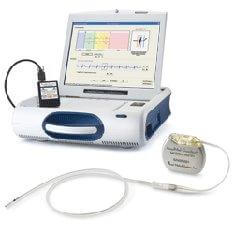
The heart monitor of the future is already here and saving lives. AngelMed‘s Guardian System is an implant that continually measures the heart much like a pacemaker. In the very early stages of a myocardial infarction (MI) patients are often unaware of the experience. Every second that they go untreated a MI victim’s chances of survival decrease. The Guardian System provides an audible warning to its host through a pager-like device and encourages them to get to a hospital quickly. Robert Fischell first discussed the Guardian back in his TED Talk in 2005. Now, the system is approved for use in Brazil, is likely to be approved in Europe this year, and is currently in clinical trials in the US. We’ve got great video of Fischell’s original talk, and a local news segment describing how the device has already saved the lives of one of the trial participants. Check them out below!
Pacemakers already help patients to stabilize their heart rates, but there are many causes of MI that can’t be regulated by electric pulses. Torn vessels, fatigued muscles, faulty valves – these serious conditions can be treated if a patient arrives at a hospital soon enough. Many patients will have clear symptoms of a heart attack and get themselves treated without need of an implant. Those patients however, won’t notice signs as quickly as the Guardian. That means the implant could get patients to hospitals quicker and that translates into less damage to the heart and better long term health. With more than a million heart attacks each year in the US alone this device has the potential to make a huge impact in medicine.
Fischell discusses the predecessor to the AngelMed Guardian System in the first 11 minutes of the clip below:
AngelMed is currently in two clinical trials for the Guardian System. The bigger of these two is the ALERTS study which has been underway for more than a year and will continue for at least another two. For those worried that early clinical trials don’t have large enough sample sets, ALERTS is looking to include up to 3000 patients! Recruitment is still ongoing. Hundreds of devices have already been implanted and lives have already been saved, including that of Bob Focht of Virginia.
As useful as the AngelMed Guardian System is proving to be, it is just one instrument that may appear in the future of body monitoring. Implants can get detailed data that other sources cannot, and these are likely to be integrated into surface monitoring systems to give a complete understanding of total body health. We’ve already seen at least two disposable patches that likely have the power to process (though not the instrumentation to record) all the data that the Guardian collects. It may not be long until such patches are sophisticated enough to directly interface with the implant? It will take at least two years for the ALERTS trial to be completed, and probably at least another year for FDA approval (perhaps much more). Digital patches are likely to incorporate ECG in that time, and perhaps even chemical and other heart monitoring applications, though that’s a bit of a stretch. With these more complex surface systems and the implant heart monitors we could have an internal and external picture of our body that could provide an extremely useful understanding of our health.
Whether the heart monitor of the future is implanted or rests on the surface of your chest, there’s little doubt that it will be there. Fischell has it right: if we want to help heart attack patients we need them to get treatment as soon as possible. The monitors of the future may be cheap enough that everyone has one. And they won’t just track our hearts, but our blood sugar, our hydration, and our temperatures as well. It will help us improve our medical care through a mountain of data and extremely personalized therapy. Further down the line, implants may prove to be a way to pair cutting edge monitoring with on the spot treatments. We’ve seen new implants being tested for epilepsy and diabetes. As complicated as the causes for acute myocardial infarction can be, we may one day have an implant that can treat a heart attack as it happens. Saving lives may the strongest reason to put us all on the path to becoming cyborgs. Cool.
[image credit: AngelMed]
[sources: AngelMed, ClinicalTrials .gov]


